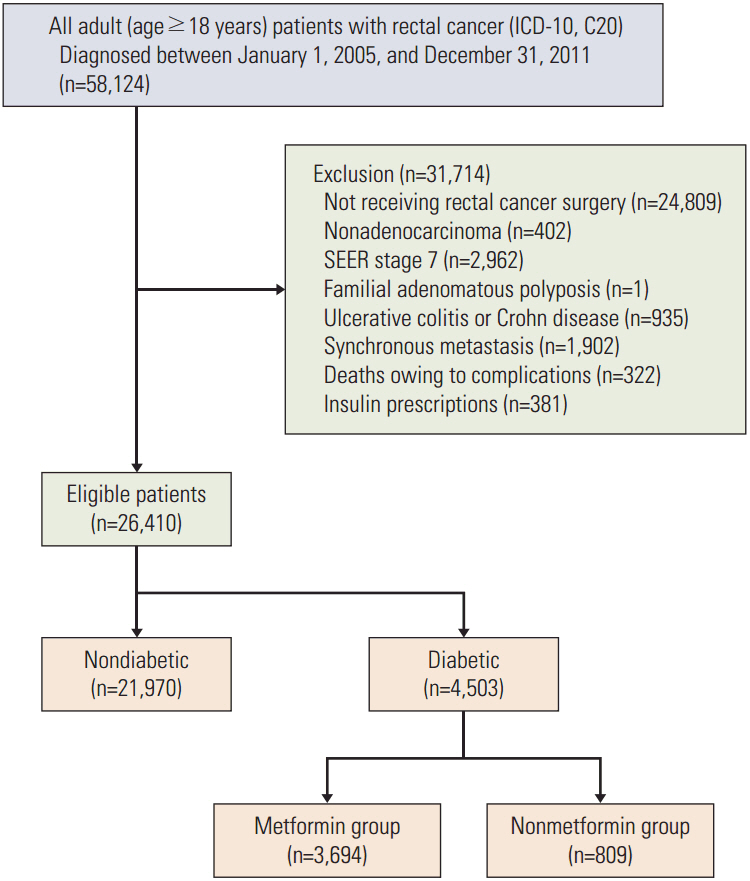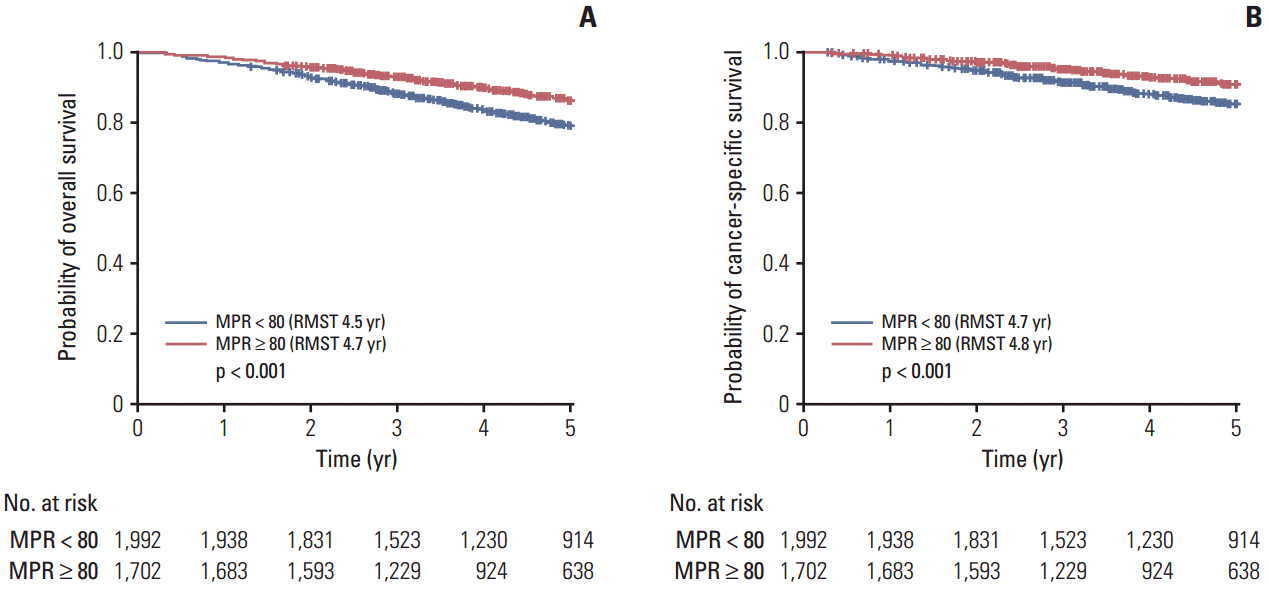Cancer Res Treat.
2017 Jan;49(1):29-36. 10.4143/crt.2016.128.
Association between Metformin Use and Survival in Nonmetastatic Rectal Cancer Treated with a Curative Resection: A Nationwide Population Study
- Affiliations
-
- 1Department of Surgery, Korea Cancer Center Hospital, Korea Institute of Radiological and Medical Sciences, Seoul, Korea.
- 2National Evidence-based Healthcare Collaborating Agency, Seoul, Korea. chpark@neca.re.kr
- 3Department of Radiation Oncology, Korea Cancer Center Hospital, Korea Institute of Radiological and Medical Sciences, Seoul, Korea. mskim@kcch.re.kr
- KMID: 2367500
- DOI: http://doi.org/10.4143/crt.2016.128
Abstract
- PURPOSE
Metformin is associated with an anticancer effect. However, the effects of metformin in rectal cancer are controversial. This study investigated the impact of metformin on the survival of patients with diabetes mellitus and nonmetastatic rectal cancer who underwent curative surgery.
MATERIALS AND METHODS
The database was provided by the Korea Center Cancer Registry and National Health Insurance Service of the Republic of Korea. A cohort of patients with newly diagnosed rectal cancer between 2005 and 2011 was identified. Drug exposure was defined as receiving the oral hypoglycemic agent for at least 90 days over the period from 6 months before the initial diagnosis of rectal cancer to the last follow-up.
RESULTS
A total of 4,503 patients were prescribed oral hypoglycemic agents and classified as the diabetic group, of which 3,694 patients received metformin for at least 90 days. Unadjusted analyses showed a significantly higher overall survival (hazard ratio, 0.596; 95% confidence interval, 0.506 to 0.702) and rectal cancer-specific survival (hazard ratio, 0.621; 95% confidence interval, 0.507 to 0.760) in the metformin group than in the nonmetformin group. The adjusted overall survival (hazard ratio, 0.631; 95% confidence interval, 0.527 to 0.755) and cancer-specific survival (hazard ratio, 0.598; 95% confidence interval, 0.479 to 0.746) in the group with a medication possession ratio of 80% or greater was significantly higher than in the group with a medication possession ratio of less than 80%.
CONCLUSION
Metformin use is associated with overall and cancer-specific survival in diabetic patients with a nonmetastatic rectal cancer treated with a curative resection.
MeSH Terms
Figure
Cited by 1 articles
-
Patterns of Rectal Cancer Radiotherapy Adopting Evidence-Based Medicine: An Analysis of the National Database from 2005 to 2016
Hae Jin Park, Sanghyun Cho, Yoon Kim
Cancer Res Treat. 2018;50(3):975-983. doi: 10.4143/crt.2017.459.
Reference
-
References
1. Jung KW, Won YJ, Kong HJ, Oh CM, Cho H, Lee DH, et al. Cancer statistics in Korea: incidence, mortality, survival, and prevalence in 2012. Cancer Res Treat. 2015; 47:127–41.
Article2. International Agency for Research on Cancer. Globocan 2013: cancer fact sheets for colorectal cancer. Lyon: International Agency for Research on Cancer;2013.3. Edge SB, Byrd DR, Compton CC, Fritz AG, Greene FL, Trotti A. AJCC cancer staging manual. New York: Springer-Verlag;2010.4. Larsson SC, Mantzoros CS, Wolk A. Diabetes mellitus and risk of breast cancer: a meta-analysis. Int J Cancer. 2007; 121:856–62.
Article5. Friberg E, Orsini N, Mantzoros CS, Wolk A. Diabetes mellitus and risk of endometrial cancer: a meta-analysis. Diabetologia. 2007; 50:1365–74.
Article6. Coughlin SS, Calle EE, Teras LR, Petrelli J, Thun MJ. Diabetes mellitus as a predictor of cancer mortality in a large cohort of US adults. Am J Epidemiol. 2004; 159:1160–7.
Article7. Siddiqui AA, Spechler SJ, Huerta S, Dredar S, Little BB, Cryer B. Elevated HbA1c is an independent predictor of aggressive clinical behavior in patients with colorectal cancer: a case-control study. Dig Dis Sci. 2008; 53:2486–94.
Article8. van Staa TP, Patel D, Gallagher AM, de Bruin ML. Glucose-lowering agents and the patterns of risk for cancer: a study with the General Practice Research Database and secondary care data. Diabetologia. 2012; 55:654–65.
Article9. Chowdhury TA. Diabetes and cancer. QJM. 2010; 103:905–15.
Article10. Geraldine N, Marc A, Carla T, Chantal M, Stefaan B, Welcome W, et al. Relation between diabetes, metformin treatment and the occurrence of malignancies in a Belgian primary care setting. Diabetes Res Clin Pract. 2012; 97:331–6.
Article11. Decensi A, Puntoni M, Goodwin P, Cazzaniga M, Gennari A, Bonanni B, et al. Metformin and cancer risk in diabetic patients: a systematic review and meta-analysis. Cancer Prev Res (Phila). 2010; 3:1451–61.
Article12. Noto H, Goto A, Tsujimoto T, Noda M. Cancer risk in diabetic patients treated with metformin: a systematic review and meta-analysis. PLoS One. 2012; 7:e33411.
Article13. Dowling RJ, Zakikhani M, Fantus IG, Pollak M, Sonenberg N. Metformin inhibits mammalian target of rapamycin-dependent translation initiation in breast cancer cells. Cancer Res. 2007; 67:10804–12.
Article14. Cardel M, Jensen SM, Pottegard A, Jorgensen TL, Hallas J. Long-term use of metformin and colorectal cancer risk in type II diabetics: a population-based case-control study. Cancer Med. 2014; 3:1458–66.
Article15. Lee JH, Kim TI, Jeon SM, Hong SP, Cheon JH, Kim WH. The effects of metformin on the survival of colorectal cancer patients with diabetes mellitus. Int J Cancer. 2012; 131:752–9.
Article16. Cossor FI, Adams-Campbell LL, Chlebowski RT, Gunter MJ, Johnson K, Martell RE, et al. Diabetes, metformin use, and colorectal cancer survival in postmenopausal women. Cancer Epidemiol. 2013; 37:742–9.
Article17. National Comprehensive Cancer Network. NCCN guidelines for treatment of cancer by site: rectal cancer. v2. Fort Washington, PA: National Comprehensive Cancer Network;2015.18. Skinner HD, Crane CH, Garrett CR, Eng C, Chang GJ, Skibber JM, et al. Metformin use and improved response to therapy in rectal cancer. Cancer Med. 2013; 2:99–107.
Article19. National Comprehensive Cancer Network. NCCN guidelines for treatment of cancer by site: colon cancer, ver. 2. Fort Washington, PA: National Comprehensive Cancer Network;2015.20. Lee YC, Lee YL, Chuang JP, Lee JC. Differences in survival between colon and rectal cancer from SEER data. PLoS One. 2013; 8:e78709.
Article21. Charlson ME, Pompei P, Ales KL, MacKenzie CR. A new method of classifying prognostic comorbidity in longitudinal studies: development and validation. J Chronic Dis. 1987; 40:373–83.
Article22. Gross CP, Guo Z, McAvay GJ, Allore HG, Young M, Tinetti ME. Multimorbidity and survival in older persons with colorectal cancer. J Am Geriatr Soc. 2006; 54:1898–904.
Article23. Polednak AP. Comorbid diabetes mellitus and risk of death after diagnosis of colorectal cancer: a population-based study. Cancer Detect Prev. 2006; 30:466–72.
Article24. Luo W, Cao Y, Liao C, Gao F. Diabetes mellitus and the incidence and mortality of colorectal cancer: a meta-analysis of 24 cohort studies. Colorectal Dis. 2012; 14:1307–12.
Article25. Stein KB, Snyder CF, Barone BB, Yeh HC, Peairs KS, Derr RL, et al. Colorectal cancer outcomes, recurrence, and complications in persons with and without diabetes mellitus: a systematic review and meta-analysis. Dig Dis Sci. 2010; 55:1839–51.
Article26. Jiang Y, Ben Q, Shen H, Lu W, Zhang Y, Zhu J. Diabetes mellitus and incidence and mortality of colorectal cancer: a systematic review and meta-analysis of cohort studies. Eur J Epidemiol. 2011; 26:863–76.
Article27. Caudle AS, Kim HJ, Tepper JE, O'Neil BH, Lange LA, Goldberg RM, et al. Diabetes mellitus affects response to neoadjuvant chemoradiotherapy in the management of rectal cancer. Ann Surg Oncol. 2008; 15:1931–6.
Article28. Garrett CR, Hassabo HM, Bhadkamkar NA, Wen S, Baladandayuthapani V, Kee BK, et al. Survival advantage observed with the use of metformin in patients with type II diabetes and colorectal cancer. Br J Cancer. 2012; 106:1374–8.
Article29. Mei ZB, Zhang ZJ, Liu CY, Liu Y, Cui A, Liang ZL, et al. Survival benefits of metformin for colorectal cancer patients with diabetes: a systematic review and meta-analysis. PLoS One. 2014; 9:e91818.
Article30. Spillane S, Bennett K, Sharp L, Barron TI. A cohort study of metformin exposure and survival in patients with stage I-III colorectal cancer. Cancer Epidemiol Biomarkers Prev. 2013; 22:1364–73.
Article
- Full Text Links
- Actions
-
Cited
- CITED
-
- Close
- Share
- Similar articles
-
- The Metformin Use and Gastric Cancer Risk
- The Effect of Metformin on Responses to Chemotherapy and Survival in Stage IV Colorectal Cancer with Diabetes
- The Outcome of Preoperative Chemoradiation to Locally Advanced Rectal Cancer
- Oncologic Results according to Operative Method after a Curative Resection for Low Rectal Cancers
- Oncological Outcome after Abdominoperineal Resection for Low Rectal Cancer




